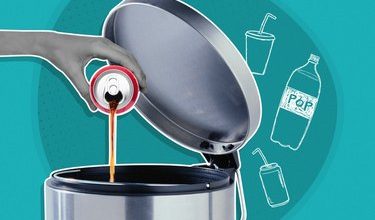Can Drinking Apple Cider Vinegar Before Bed Help You Lose Weight?

gpointstudio/iStock/GettyImages
Apple cider vinegar (ACV) has been touted as a natural remedy for just about everything it seems, from an antibiotic alternative to an acid reflux fix. Some sources even say that drinking apple cider vinegar before bed can help you lose weight.
But can sipping on ACV or trying apple cider vinegar recipes in the evening really move the scale in the morning? Let’s take a look at what the experts have to say.
Video of the Day
Video of the Day
Can Apple Cider Vinegar Help You Lose Weight?
Overall, there is no strong evidence that apple cider vinegar alone can help you lose weight, says Mary Margaret Dagen, MD, an obesity medicine specialist certified by the American Board of Obesity Medicine.
However, some health benefits of apple cider vinegar may support weight loss:
Lowers Blood Sugar
There is some evidence that ACV can help reduce blood sugar levels, which could play a role in weight loss and management, Barry Sears, PhD, president of the Inflammation Research Foundation and author of the Zone Diet book series, tells LIVESTRONG.com. Higher blood sugar levels trigger the production of more insulin, which encourages your body to store the sugar as fat, per the Mayo Clinic.
One systematic review and meta-analysis published May 2017 in Diabetes Research and Clinical Practice found that vinegar consumption helps to lower blood sugar levels after a meal.
Reduces Fat Storage
Although more studies are needed, Sharon Katzman, RDN, a dietitian with the Chambers Center by PALM Health in Morristown, New Jersey, says that ACV may reduce fat storage and help decrease visceral fat, the “hard” fat that accumulates deep in the belly.
Indeed, one randomized clinical trial that appeared April 2018 in the Journal of Functional Foods found that the combination of apple cider vinegar and a restricted calorie diet over a period of 12 weeks was effective in significantly reducing body weight, BMI, hip circumference and visceral fat.
The study also showed that the combination had some additional health benefits, such as reducing appetite and lowering triglyceride and total cholesterol levels. And, as a bonus, high-density lipoprotein cholesterol — otherwise known as “good” cholesterol — levels significantly increased in those who incorporated ACV compared to those who didn’t.
Slows Digestion
ACV helps to slow the emptying of the stomach, making you feel full longer, says Kristi Veltkamp, RDN, a dietitian with Spectrum Health.
“Apple cider vinegar can help with weight loss by increasing satiety, or a sense of satisfaction associated with eating,” says Scott Jamison, MD, a board-certified internal medicine specialist with PALM Health in St. Louis.
When Should You Drink ACV to Lose Weight?
Sears suggests taking ACV before meals to help regulate your blood sugar levels and help you feel full on less food. Katzman agrees that you can take ACV before or with your meals, or you could try taking it 30 minutes before bed to help with higher blood sugar readings in the mornings. Since there is no research on the best timing for ACV consumption, you may need to try a few different tactics to land on the right one for you.
How to Drink Apple Cider Vinegar Before Bed
If you want to try ACV as a possible weight-loss strategy, the experts recommend drinking ½ to 1 tablespoon of ACV diluted in 4 to 8 ounces of water. “ACV needs to be diluted in water, or it can cause nausea, worsen acid reflux and cause tooth enamel erosion,” Katzman warns.
To that end, Dr. Jamison recommends drinking ACV through a straw to reduce the exposure of the acid to your dental enamel.
If you’re someone who doesn’t usually consume vinegar, it might be a good idea to start with a small dose first to see how well your stomach tolerates it, and then build your way up to the full tablespoon. Dr. Dagen recommends starting with one dose daily, before your largest meal.
“As you grow more accustomed to the taste of ACV, you can increase the concentration by diluting it in less water,” Katzman says.
However, don’t forget that because the principal component of vinegar is acetic acid, ACV will taste bitter, so it may take some time to get used to it. If the bitterness bothers you, you could try a low-calorie sweetener like Stevia to mask the strong flavor, suggests Veltkamp.
“You can try adding a little dash of either cinnamon, honey, ginger or lemon juice to make the flavor more pleasing,” Dr. Jamison says. “Apple cider vinegar is an acquired taste!”
If you don’t want to drink ACV straight-up, you could also try adding it to salads or use it as a marinade instead.
Side Effects of Drinking Apple Cider Vinegar
The most important thing you need to do before trying ACV for weight loss or other health benefits is to speak with your doctor to ensure it is safe for you to take.
Even though drinking apple cider vinegar is considered safe for most people, there are some effects of ACV you should keep in mind:
- It could cause throat irritation: Undiluted
apple cider vinegar could cause throat and mouth irritation if you drink it too
often or in excessive amounts. So stick to the suggested one-half to one
tablespoon per day and dilute it as much as needed in a glass of water
if you experience irritation. - It can damage your teeth: Veltkamp
cautions that ACV is acidic and can damage tooth enamel. “Be sure to rinse
after swallowing and do not let it linger in your mouth,” she says. You will be more at risk for tooth damage if you drink excessive amounts of undiluted apple cider vinegar. - It may interact with medications you’re taking: Dr. Dagen warns that apple cider vinegar might interact with certain supplements or
drugs, like diuretics or insulin. Be
sure to check with your doctor if any of the medications you take regularly may
interact with ACV. Taking
too much ACV or taking it when also taking these drugs could cause the
body’s potassium levels
to dip too low, according to the Mayo Clinic. - It may not be not appropriate for everyone: Because apple cider vinegar can slow the rate food leaves the stomach, it may not be safe for people with certain medical conditions. For example, if you have gastroparesis, a condition in which your stomach empties at a slower rate than normal to begin with, ACV may make it worse.
In the end, if you’re looking to lose weight and are considering adding ACV to your diet to help, be sure to approach the process in a healthy, realistic way and not rely on any one strategy to be a quick fix.
“The best way to lose weight is to restrict calories without hunger or fatigue,” Sears says. “That can only be done if you maintain a relatively even balance of protein, carbohydrates and fat at each meal.”




